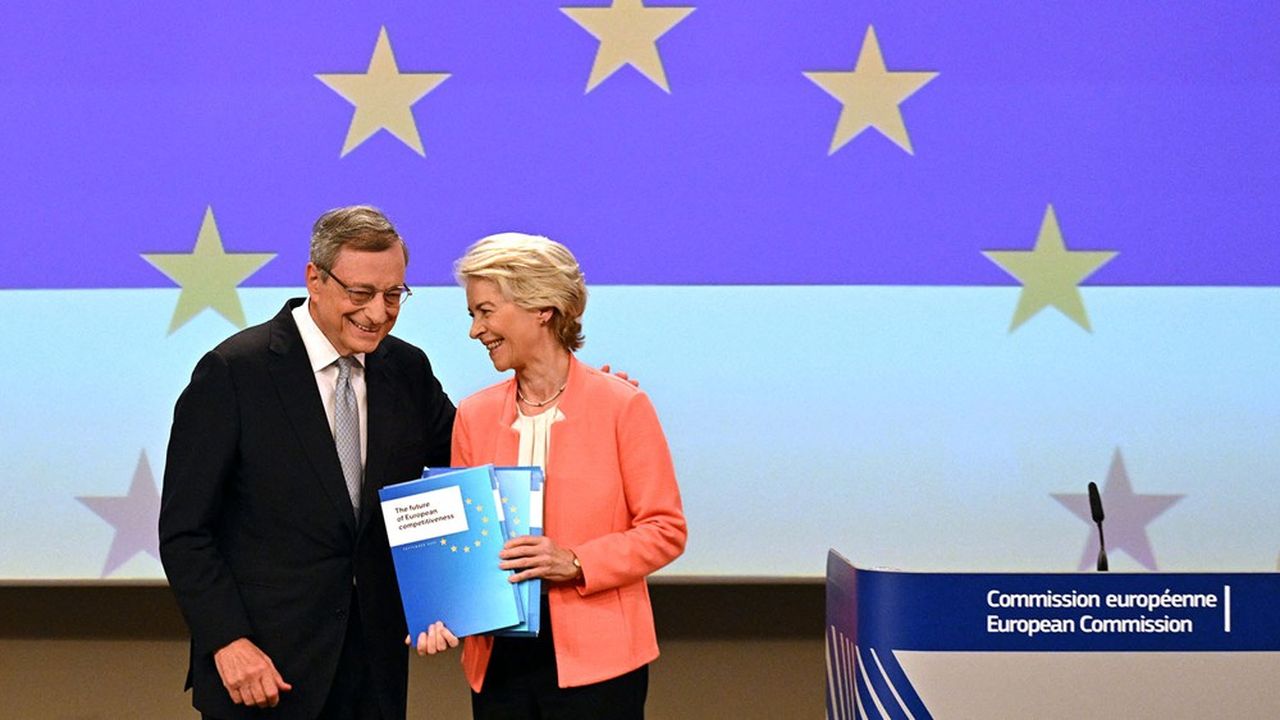
“We are already in crisis.” And if the European Union (EU) does not move quickly, it is the assurance of “a slow agony.” Mario Draghi dramatized the presentation of his report on the future of the European economy this Monday morning, but he has reasons to do so. Because the prosperity and social model of the Old Continent are under attack from all sides. And, in the global competition, Europe is starting with some handicaps. It is time to react.
Productivity gains in Europe are low and well below those recorded by the United States. And what the former president of the European Central Bank (ECB) foresees in the future is nothing more and nothing less than a great stagnation that will last at least 25 years. “By 2040, the EU workforce is expected to decline by almost 2 million workers each year” and “growth in Europe will stagnate. If the EU maintained its average growth rate of labor productivity since 2015 at 0.7%, GDP would remain constant by 2050,” predicts the report led by Mario Draghi. Hence the Italian’s desire to deregulate the European economy where legislation is stronger than across the Atlantic.
A more open Europe
Hence also the goal of achieving a truly single market. The objective is not new. Another Italian, former President of the Council, Mario Monti, had submitted a report on this subject… in 2010 and Enrico Letta submitted another last April. But it is clear that the single market remains fragmented. Neither workers nor savings circulate as easily as in the United States. However, the size of the domestic market is particularly important for companies experiencing strong growth.
It is also in the field of high technologies that the EU is failing. “Outside of high technologies, productivity is better in Europe than in the United States. So the solution is not so much more flexibility and lower labor costs as training and skills,” argued Mario Draghi.
Then, the EU is poorly equipped in the new world of geopolitical tensions and rivalries. The Old Continent is more open to external winds than China and the United States. In 2023, exports of goods and services represented 29.4% of the eurozone’s GDP, compared to 20.8% for China and only 11.2% for the United States. And this dependence on external demand has only grown over the past 30 years. As a result, “when our partners no longer respect the rules of international trade, we are more vulnerable,” as Mario Draghi said on Monday.
The Commission is already aware of this and has begun to respond to this globalisation that is becoming much less cooperative. For example, Brussels has increased customs duties on imported Chinese electric vehicles, accused of benefiting from large public subsidies. But the trade war could well see new developments. If Donald Trump were elected President of the United States next November and he implemented the promised customs duty increases, then the EU would be the first to be affected, along with China.
Joint debt
Finally, the architecture of the Eurozone, which is still incomplete, makes it difficult to finance investment needs for digital technology, the fight against climate change and defence. The solution could involve joint debt since the most indebted states no longer have the means to do so. The French public debt is expected to weigh twice that of Germany in 2029 if we are to believe the forecasts of the International Monetary Fund (IMF).
This divergence in public debt is an existential risk in the long term for the eurozone at a time when it is necessary to invest. It makes the need for common debt more urgent to support the economy of the indebted countries. But at the same time, the more the public debts of the Member States follow different trajectories, the less the use of common debt seems acceptable to some. Countries that have managed their public finances rigorously continue to accuse those that display constant deficits. The issue is about to become politically explosive.
Mit einer gemeinsamen EU-Schuldenaufnahme lösen wir keine strukturellen Probleme: Unternehmen mangelt es necht an Subventionen. This means that the Office and Plan Wirtschaft will be processed. Und haben Schwierigkeiten, an private Kapital zu kommen. Daran müssen wir beiten. CL https://t.co/kjMz17Jwys
— Christian Lindner (@c_lindner) September 9, 2024
Moreover, just a few hours after the presentation of the former Italian Prime Minister, the German Minister of Finance, Christian Lindner, came up with an X-rated response: “With a common European debt, we will not solve any structural problems: companies do not lack subsidies. They are tied down by bureaucracy and the planned economy. And they have difficulty accessing private capital.” The finance minister of the leading European economy would like to bury this report.




